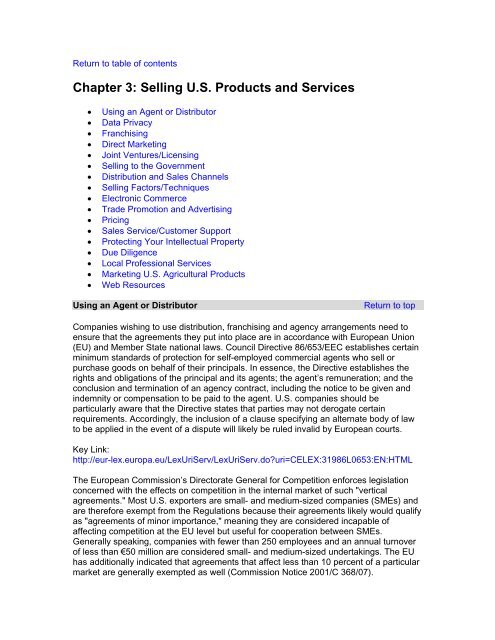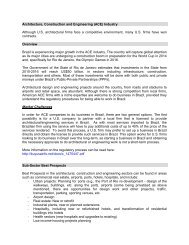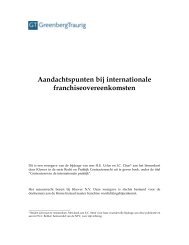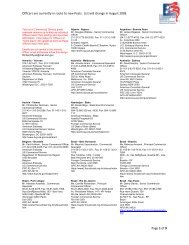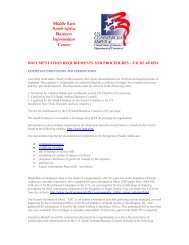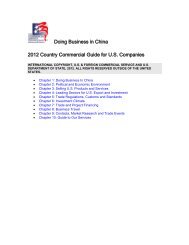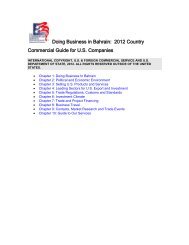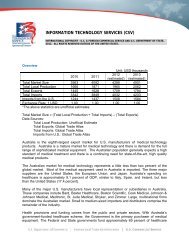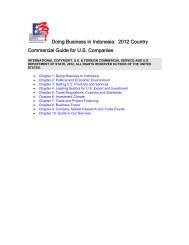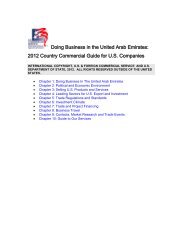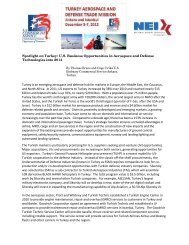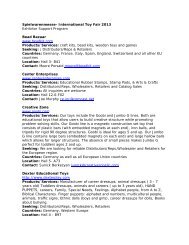Doing Business In Germany: A Country Commercial ... - Export.gov
Doing Business In Germany: A Country Commercial ... - Export.gov
Doing Business In Germany: A Country Commercial ... - Export.gov
You also want an ePaper? Increase the reach of your titles
YUMPU automatically turns print PDFs into web optimized ePapers that Google loves.
Return to table of contents<br />
Chapter 3: Selling U.S. Products and Services<br />
• Using an Agent or Distributor<br />
• Data Privacy<br />
• Franchising<br />
• Direct Marketing<br />
• Joint Ventures/Licensing<br />
• Selling to the Government<br />
• Distribution and Sales Channels<br />
• Selling Factors/Techniques<br />
• Electronic Commerce<br />
• Trade Promotion and Advertising<br />
• Pricing<br />
• Sales Service/Customer Support<br />
• Protecting Your <strong>In</strong>tellectual Property<br />
• Due Diligence<br />
• Local Professional Services<br />
• Marketing U.S. Agricultural Products<br />
• Web Resources<br />
Using an Agent or Distributor Return to top<br />
Companies wishing to use distribution, franchising and agency arrangements need to<br />
ensure that the agreements they put into place are in accordance with European Union<br />
(EU) and Member State national laws. Council Directive 86/653/EEC establishes certain<br />
minimum standards of protection for self-employed commercial agents who sell or<br />
purchase goods on behalf of their principals. <strong>In</strong> essence, the Directive establishes the<br />
rights and obligations of the principal and its agents; the agent’s remuneration; and the<br />
conclusion and termination of an agency contract, including the notice to be given and<br />
indemnity or compensation to be paid to the agent. U.S. companies should be<br />
particularly aware that the Directive states that parties may not derogate certain<br />
requirements. Accordingly, the inclusion of a clause specifying an alternate body of law<br />
to be applied in the event of a dispute will likely be ruled invalid by European courts.<br />
Key Link:<br />
http://eur-lex.europa.eu/LexUriServ/LexUriServ.do?uri=CELEX:31986L0653:EN:HTML<br />
The European Commission’s Directorate General for Competition enforces legislation<br />
concerned with the effects on competition in the internal market of such "vertical<br />
agreements." Most U.S. exporters are small- and medium-sized companies (SMEs) and<br />
are therefore exempt from the Regulations because their agreements likely would qualify<br />
as "agreements of minor importance," meaning they are considered incapable of<br />
affecting competition at the EU level but useful for cooperation between SMEs.<br />
Generally speaking, companies with fewer than 250 employees and an annual turnover<br />
of less than €50 million are considered small- and medium-sized undertakings. The EU<br />
has additionally indicated that agreements that affect less than 10 percent of a particular<br />
market are generally exempted as well (Commission Notice 2001/C 368/07).


